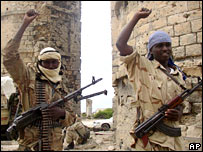Tuesday, September 26, 2006
BBC NEWS
 Islamic Courts fighters took control of the capital Mogadishu in June |
Ethiopia supports the weak government but denies sending troops to help them against the Union of Islamic Courts.
On Sunday, the UIC took control of the key port of Kismayo after the defence minister’s forces fled the town.
The prime minister has appealed for international help against “al-Qaeda” and “terrorist” expansion.
High alert
“The incursion of Ethiopian troops into Somali territories is a declaration of war on Somalia,” said UIC national security chairman Sheik Yusuf Indahaadde.
“We call on the international community to urge Ethiopia to withdraw its troops from Somalia. If that doesn’t happen the consequences of insecurity created by Ethiopia will spread to neighbouring countries and to East Africa as a whole.”
But Somali government spokesman Abduraman Dinari denied that any Ethiopia had crossed the border and said the reports were being fabricated by the Islamists to distract attention from their advance into Kismayo.
Eyewitnesses have reported that hundreds of troops wearing Ethiopian military uniforms have crossed the border and are in a military camp just outside Baidoa – the only town controlled by the internationally recognised government.
A security official in Baidoa told the BBC that his forces were on high alert and were ready to defend the town against any Islamist attack.
The UIC say they took Kismayo to prevent it being used to bring foreign peacekeepers into the country, as requested by the interim government.
They later fired at demonstrators, reportedly killing three people.
Speaking after the takeover of Kismayo, Somalia’s interim Prime Minister Ali Mohamed Ghedi appealed for aid soon for his beleaguered government.
“I would appeal to the governments of the region to join our efforts and protect the region from the expansion of this al-Qaeda network, these terrorists.”
Running away
Mr Ghedi also said the takeover of Kismayo had been a “violation” of a ceasefire agreed between the UIC and the interim government.
Earlier this month, the African Union agreed to a request by Somalia’s transitional government to send in a regional peacekeeping force.
Thousands of people are reported to have fled the city in recent days.
The UIC has steadily increased its hold on Somalia since its fighters took control of the capital, Mogadishu, in June.
Mr Ghedi’s government was set up in 2004 after more than two years of talks designed to give Somalia its first effective national government since 1991.
Source: BBC, Sept 26, 2006





